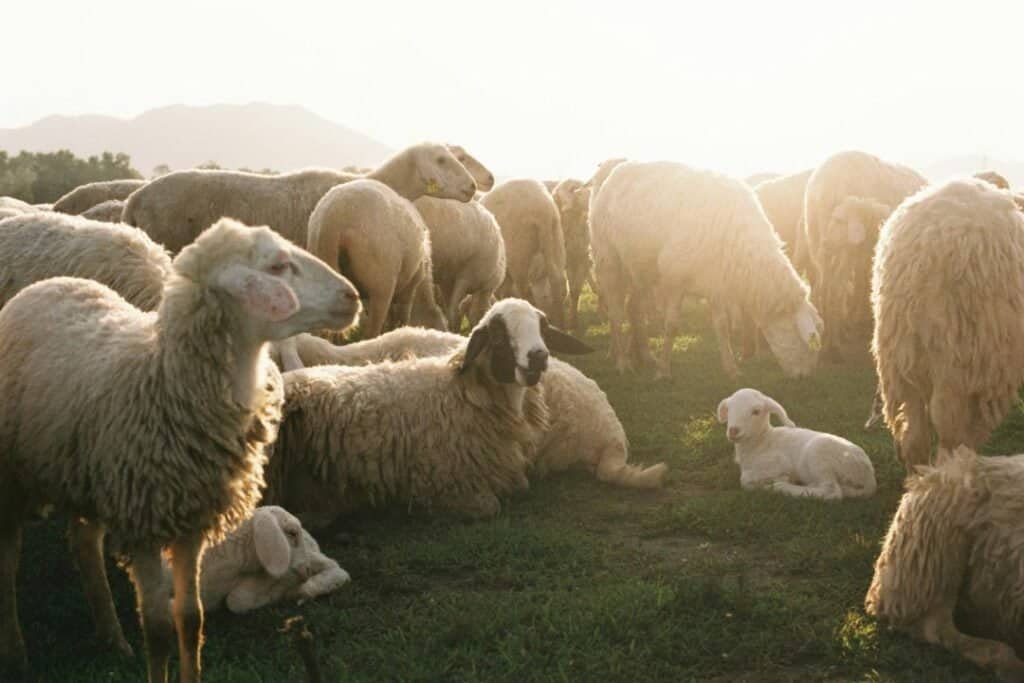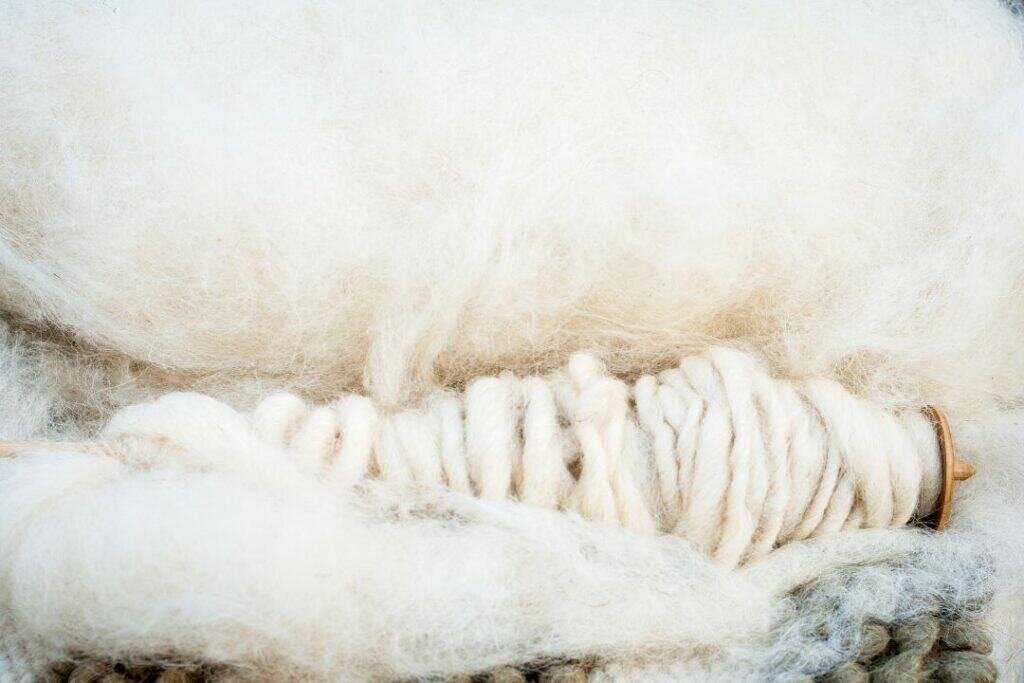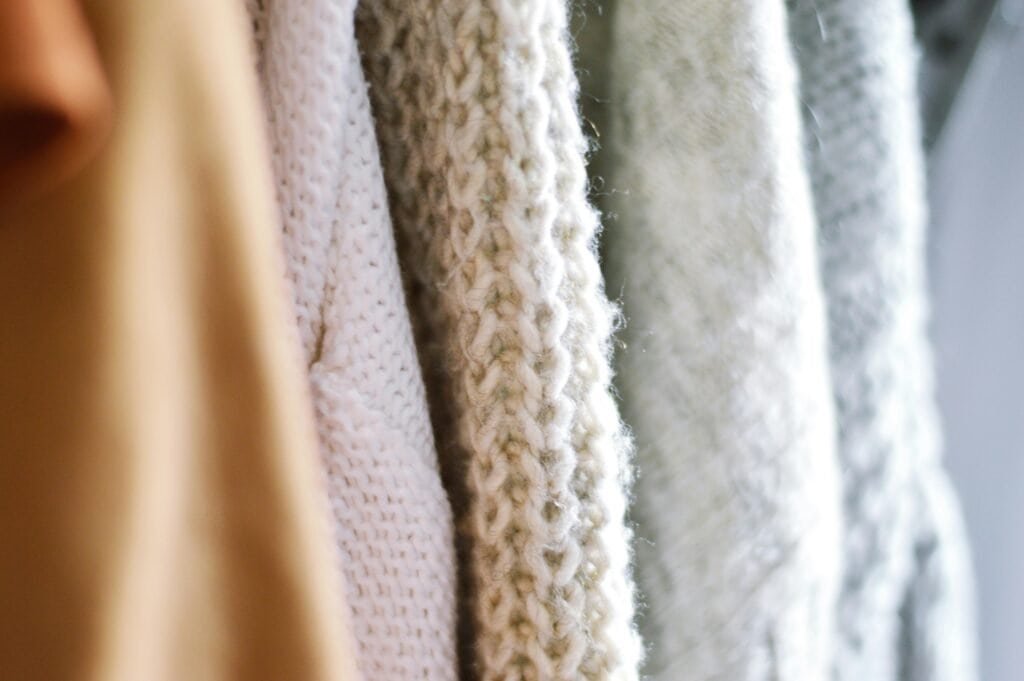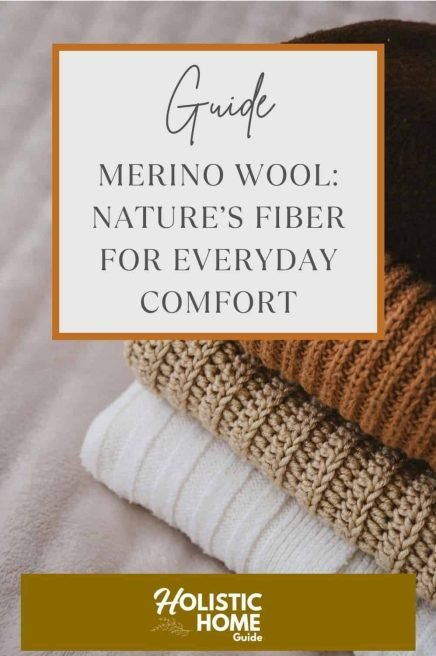Merino wool is one of nature’s most remarkable fibers. It’s soft enough for the most delicate skin, warm enough for winter hikes, and breathable enough for summer trails. For anyone who values comfort, sustainability, and natural fibers, Merino wool is a great choice for your wardrobe.
In this guide, we’ll explore what makes Merino wool so unique, why it’s ideal for daily wear, and how to care for it naturally. You’ll learn about its origins, environmental benefits, and how to choose responsibly sourced pieces that align with a holistic, sustainable lifestyle.
This post may contain affiliate links which means we may receive a commission for purchases made through links. As an Amazon Associate we earn from qualifying purchases. Learn more on our Privacy Policy.

What Is Merino Wool?
Merino wool comes from a special breed of sheep originally from Spain, now raised primarily in Australia and New Zealand. These sheep produce fine, soft fibers that are much thinner than regular wool. This delicate structure gives Merino its signature smoothness and breathability.
Each Merino fiber naturally responds to changes in temperature, keeping you warm in cold conditions and cool when it’s hot. It’s a living material that works in harmony with your body — one of the reasons it’s so beloved by outdoor enthusiasts.
Natural Benefits of Merino Wool
- Soft and non-itchy against the skin
- Temperature regulating for all seasons
- Odor resistant and antibacterial
- Moisture-wicking and breathable
- Fully biodegradable and renewable
The Science of Comfort
Merino wool fibers are much finer than human hair — usually around 17 microns thick. That fineness creates a fabric that feels silky, not scratchy. The fibers have a natural crimp, which traps tiny air pockets. These pockets insulate against cold air while allowing moisture to escape, keeping you comfortable in any climate.
Unlike synthetic fabrics that can trap sweat and odor, Merino actively neutralizes bacteria. You can wear it for several days without it smelling or losing shape, making it ideal for minimalist wardrobes.

Why Merino Wool Is Sustainable
Merino represents an elegant balance between nature and practicality. It’s renewable, biodegradable, and produced with minimal energy compared to synthetic fibers. Each year, Merino sheep grow a new fleece, creating a continuous, natural supply.
Environmental Advantages
- Biodegradable: Merino fibers naturally decompose in soil within a year, releasing nutrients back into the earth.
- Renewable: Sheep regrow their fleece annually, reducing reliance on petroleum-based textiles.
- Low odor retention: Merino stays fresher longer, meaning fewer washes and lower water use.
- Durable: High-quality Merino garments can last for years, promoting slow, sustainable fashion.
Merino Wool Clothing Essentials
From cozy homewear to travel, this natural fiber adapts beautifully to modern living. It’s the ultimate do-it-all fabric — practical, elegant, and kind to your skin.
1. Merino Base Layers
These lightweight layers are perfect for hiking, skiing, or simply staying warm without the bulk. They wick moisture, regulate temperature, and resist odor naturally.
2. Merino Socks
Soft, breathable, and long-lasting, Merino socks keep feet dry and comfortable.
3.Merino Sweaters and Cardigans
These make ideal year-round staples — cozy in winter, yet breathable enough for spring and fall. Their elegant drape and softness elevate even the simplest outfit.
4. Merino T-Shirts and Leggings
Ultra-soft and lightweight, Merino T-shirts and leggings are a minimalist’s dream. They’re perfect for layering or wearing on their own during travel or yoga practice.

Pros and Cons of Merino Wool
| Pros | Cons |
|---|---|
| Soft, breathable, and temperature regulating | Higher cost than synthetic alternatives |
| Odor resistant and naturally antibacterial | Requires gentle washing and air drying |
| Renewable and biodegradable | May shrink with hot water or heat exposure |
| Lightweight yet insulating | Can be delicate if made with lower-quality fibers |
How to Care for Merino Wool Naturally
Merino wool is durable but benefits from gentle care while washing. With the right routine, your garments can last for many years while maintaining their softness and shape.
Washing Tips
- Hand wash or machine wash on a cold, gentle cycle using mild, natural detergent.
- Avoid fabric softeners, which can coat the fibers and reduce breathability.
- Lay flat to dry in the shade. Avoid tumble drying or wringing.
Storage and Longevity
- Fold instead of hang to prevent stretching.
- Use cedar balls or lavender sachets to naturally repel moths.
- Spot clean between washes to reduce wear.
Merino Wool vs. Other Fabrics
| Fabric | Softness | Temperature Regulation | Odor Resistance | Sustainability |
|---|---|---|---|---|
| Merino Wool | Very soft | Excellent | Excellent | High |
| Regular Wool | Moderate | Good | Good | High |
| Cashmere | Extremely soft | Excellent | Good | High (if responsibly sourced) |
| Cotton | Soft | Limited | Poor | Medium (organic preferred) |
| Linen | Moderate | Excellent | Good | High |
| Polyester | Varies | Low | Poor | Low (synthetic) |
Frequently Asked Questions
Is Merino itchy? No. Merino fibers are much finer than traditional wool, making them smooth and soft against the skin.
Is Merino good for summer? Yes. Merino regulates body temperature and wicks moisture, keeping you cool and dry even in warm weather.
Will Merino shrink? Only if exposed to hot water or heat. Always wash in cool water and air dry flat to maintain size and softness.
Is Merino waterproof? Not completely, but it is water resistant. The fibers can absorb up to 30% of their weight in moisture while still feeling dry.
Is Merino sustainable? Yes. It’s a renewable natural fiber that decomposes in soil and requires far less washing than synthetics, reducing energy and water use.

Merino Wool for Mindful Living
Choosing Merino wool is more than a clothing decision — it’s a commitment to quality, longevity, and connection with the natural world. Its comfort reminds us that true luxury lies in simplicity. A few well-made Merino pieces can replace an entire drawer of synthetics, helping you live lightly while staying warm and grounded.
Explore your wardrobe with fresh eyes. Replace fast-fashion fleece with natural fibers that align with your values. Choose Merino wool for comfort that honors both your body and the planet.







